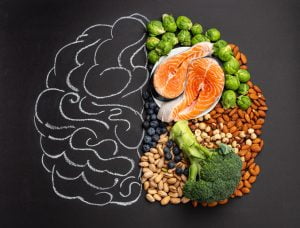We live in a world of distractions, from social media and phone apps to work emails that follow us home. These distractions make concentration difficult for anyone but can be especially frustrating for people diagnosed with attention-deficit/hyperactivity disorder (ADHD). Crucial symptoms of ADHD, estimated to affect 1 in 25 Americans, include difficulty paying attention, hyperactivity, and impulsive behavior. It usually begins in childhood but often lingers through adulthood as well (Naidoo 2020, 97).
“Fighting ADHD takes a combination of proper medications and a proper diet,” -Dr. Uma Naidoo
While the impact of ADHD varies from person to person, it may lead people to struggle with anxiety, learning, and even depression (Centers for Disease Control and Prevention) Research is still ongoing into the causes and risks associated with ADHD. But for those affected, it appears that brain chemical imbalances play a large role, especially levels of dopamine (the brain’s “reward” chemical) and noradrenaline (a fight-or-flight hormone). While these chemicals stay in the brain, the precursor molecules that create dopamine and noradrenaline are forged in the gut — meaning the foods we eat can help or hinder us in combatting ADHD (Naidoo 2020, 97). This article will explore how to build habits related to diet and ADHD.
“Fighting ADHD takes a combination of proper medications and a proper diet,” (103) writes Dr. Uma Naidoo in her book This is Your Brain on Food. If you or a loved one struggles with symptoms of ADHD, make sure to consult with a provider! However, below are listed some diet suggestions to keep in mind, taken from Naidoo’s book.
ADHD and Supporting Brain Health through Diet Nutrition: Good Foods, Which to Avoid, and Habits to Develop
Food for Good ADHD Habits
- Breakfast: A nutritious breakfast can help increase cognition and alertness.
- Sticking with a regular eating schedule can help regulate dopamine and noradrenaline levels.
- Caffeine can have a positive impact on attention and memory, increasing motivation, alertness, vigilance, efficiency, concentration and cognitive performance. However, don’t go overboard on the coffee, as it can cause you to feel wired and have trouble sleeping! A general guideline for adults is keeping caffeine intake below 400 mg a day.
- Polyphenols are antioxidants that can help alleviate oxidative stress on the brain, which can damage brain cells and alter levels of neurotransmitters (like dopamine). People with ADHD may lack some natural ability to combat oxidative stress — which happens when there are too many unstable molecules in your body — so it’s important to incorporate polyphenols into your diet! They can be found in berries, cherries, eggplant, onions, kale, coffee, and green tea.
- Vitamins C and B1 have also been shown to increase cognition and information processing. Vitamin C is found in citrus fruits like oranges, kiwi, lemon, and grapefruit; bell peppers; strawberries; tomatoes; cruciferous vegetables like broccoli, Brussels sprouts, cabbage, and cauliflower; and white potatoes (The Nutrition Source: Vitamin C). Vitamin B1 is found in fortified breakfast cereals; pork; fish; beans and lentils; green peas; enriched cereals, breads, noodles, rice; sunflower seeds; and yogurt (The Nutrition Source: Thiamin — Vitamin B1).
Zinc, iron, and magnesium are all critical minerals to your body’s synthesis of dopamine and may be lower in people with ADHD. Potassium is another mineral that may increase cognition and information processing. To incorporate these minerals into your diet, look for these foods:
- Iron: Shellfish, lean red and organ meats (in moderation!), legumes, pumpkin seeds, broccoli, dark chocolate (also in moderation!)
- Magnesium: Avocados, nuts, and seeds, legumes, whole grains, salmon, mackerel
- Potassium: Sweet potatoes, bananas, mushrooms, oranges, peas, cucumbers
- Zinc: Seafood (especially cooked oysters), lean beef and poultry; lower amounts are found in beans, nuts, whole grains
ADHD Symptom Triggering Foods to Avoid
Certain foods have been linked to decreased attention and concentration, so it’s important to consider avoiding them. While cutting out these items may not completely eliminate the symptoms of ADHD, removing them from your diet can help improve overall cognitive function.
- Gluten intolerance or sensitivity has been connected to ADHD. Gluten is found in bread, pizza, and pasta, but also in a wide range of processed foods and alcohol. Gluten-free diets are becoming easier and easier to follow now, with a wide range of products now available in grocery stores!
- A1 beta-caseins (a type of protein) found in real milk and other dairy products may cause gastrointestinal inflammation and slow down thinking for people with ADHD. Check out product labels to find A2-only milks, or try nut milks and milk nut yogurts.
- There is a widely held belief that sugar is correlated to ADHD, but scientific studies have shown that this may not be the case. However, it is always good to limit your consumption of baked goods, candy, soda, or any products sweetened with sugar or high-fructose corn syrup.
- The effectiveness of food colorings and additives in impacting ADHD symptoms remains uncertain, but eliminating them from meals could be a viable option if dietary modifications prove ineffective. For better focus, learn about ADHD-triggering foods to avoid.
Sources:
Centers for Disease Control and Prevention. (2022, Aug. 9). Attention Deficit/Hyperactivity Disorder: What is ADHD? https://www.cdc.gov/ncbddd/adhd/facts.html#Causes. Harvard T. H. Chan School of Public Health. (2023, March). The Nutrition Source: Vitamin C. https://www.hsph.harvard.edu/nutritionsource/vitamin-c/. Harvard T. H. Chan School of Public Health. (2023, March). The Nutrition Source: Thiamin — Vitamin B1. https://www.hsph.harvard.edu/nutritionsource/vitamin-b1/. Naidoo, Uma. (2020). This is Your Brain on Food: An Indispensable Guide to the Surprising Foods that Fight Depression, Anxiety, PTSD, OCD, ADHD, and More. New York: Little, Brown Spark.




